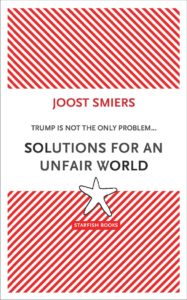A World Political Party: The Time Has Come
Shared problems require shared action. The world economy and deepening global risks bind us together, but we lack the collective global agency required to address them. A sustainable global future will be impossible without a fundamental shift from the dominant national mythos to a global worldview, and the concomitant creation of institutions with transformative political agency. A world political party would be well-suited to bring about such a shift. Although such a party will not materialize overnight, it can emerge from the chrysalis of activism and experimentation already forming on the world stage.
The transnational Democracy in Europe Movement 2025 (DiEM25) is a compelling experiment in this vein, providing useful lessons for a world political party proper. Although the challenges to forming a transformative world party are profound, the risks of inaction are grave – and the rewards of success momentous.
Party Time
We now understand how small our planet has become. The local and global have become profoundly intertwined as our daily activities depend on the workings of the world economy. Common risks, like ecological crises and weapons of mass destruction, tie all our fates together.
Despite such interconnectedness, people’s everyday experiences still differ greatly. For example, consider the contrasts between a day in the life of a high school teacher in Finland, a textile worker in China, a CEO of a multinational corporation in Brazil, and a janitor in Kenya—a case study in lateral and vertical diversity. Their lives’ possibilities are interwoven and shaped by the global economy, but in sharply divergent ways. Shared problems require shared action. But to achieve collective agency on the global level, disparate individuals must learn to see themselves (and their daily lives) as fundamentally connected to one another through common global structures, processes, and challenges. Such collective learning has the potential to politicize the world economy and the institutions that govern it. Rather than being treated as immutable, these institutions can and must become the subject of political contestation. Both radically reforming existing institutions and building new ones must be on the agenda. Seeing the world system as malleable goes hand in hand with the quest for globalized political agency, for advancing transformative visions of “another world.”
The roots of the contemporary quest go back to the formation of transnational political associations in the nineteenth century with the burgeoning peace and labor movements. A century later, in the 1960s and 1970s, new movements for gender and racial equality, nuclear disarmament, and environmental justice sparked global organizing and activism. In the 1980s, economic globalization became an era-defining issue. Then, as the walls of the Cold War came tumbling down and the Internet eroded barriers to communication, the concept of global civil society took hold. To this day, civil society carries the banner of transformative hope, expressed through pursuit of peace, justice, democracy, economic well-being, and ecological sustainability.
The growing organization and influence of global civil society can be seen in the human rights movement. For example, an international criminal court was
first proposed in 1872 in response to the atrocities of the Franco-Prussian War. However, the NGO Coalition for an International Criminal Court (ICC), which featured prominent human rights organizations, was not founded until 1995. By the time the Rome Statute was adopted in July 1998, more than 800 organizations had joined the campaign; in the early 2000s, the number was more than one thousand. The ultimate creation of the ICC, though noteworthy, was an achievement tempered by the nonparticipation of China, Russia, and the US, among others, and by accusations, especially by African states, that the court has been guilty of applying double standards. Read more
Here’s What A Green New Deal Looks Like In Practice
With the climate change challenge growing more acute with every passing year, the need for the adoption of a new political economy that would tackle effectively both the environmental and the egalitarian concerns of progressive people worldwide grows exponentially. Yet, there is still a lot of disagreement on the left as to the nature of the corresponding political economy model. One segment of the left calls for the complete overthrow of capitalism as a means of dealing with climate change and the growing levels of economic inequality in the era of global neoliberalism, while another one argues against growth in general. In the interview below, Robert Pollin, distinguished professor of economics and co-director of the Political Economy Research Institute at the University of Massachusetts-Amherst, explains some issues raised by each of these positions, and how to move toward solutions grounded in a fuller understanding of economic development.
C.J. Polychroniou: Bob, let’s start with the “degrowth” argument for securing climate stabilization and realizing egalitarian aims. What’s wrong with this political economy model in an age of catastrophic climatic conditions brought about through 250 or so years of capitalist expansion via the use of fossil fuel energy sources?
Robert Pollin: Degrowth proponents have made valuable contributions in addressing many of the untenable features of economic growth. I agree with degrowth proponents that economic growth in general produces a wide range of negative environmental effects. I also agree that a significant share of what is produced and consumed in the current global capitalist economy is wasteful, especially most of what high-income people throughout the world consume. It is also obvious that economic growth per se makes no reference to the distribution of the benefits of growth and, more generally, offers no critique of capitalism as a mode of production.
But on the specific issue of climate change, degrowth does not provide anything close to a viable stabilization framework — that is, to stabilize the global mean temperature at a level that will prevent severe negative ecological feedback effects, such as increasing frequency of droughts and floods. Consider some very simple arithmetic. According to its most recent October 2018 report, the Intergovernmental Panel on Climate Change (IPCC) now concludes that a viable climate stabilization program will necessitate limiting the global mean temperature increase to 1.5° Celsius as of 2100. This in turn will require global net carbon dioxide (CO2) emissions falling by about 45 percent as of 2030 and reaching net zero emissions by 2050. Let’s focus for the moment on the 2030 target of a 45 percent CO2 emissions contraction. Following a degrowth agenda, let’s assume that global GDP [gross domestic product] contracts by 10 percent between now and 2030. That would entail a reduction of globalGDP four times greater than during the 2007–09 financial crisis and Great Recession. In terms of CO2 emissions, the net effect of this 10 percent GDP contraction, considered on its own, would be to push emissions down by precisely 10 percent. It would not come close to hitting the IPCC target of a 45 percent CO2 reduction. At the same time, this 10 percent global GDP contraction would result in huge job losses and declines in living standards for working people and the poor. Global unemployment rose by over 30 million during the Great Recession. I have not seen any degrowth proponent present a convincing argument as to how we could avoid a calamitous rise in mass unemployment if GDP were to fall four times as much as during 2007–09. Read more
TED ~ 10 Talks To Celebrate Black History Month
 Insightful talks that offer fresh, thoughtful perspectives on Black identity.
Insightful talks that offer fresh, thoughtful perspectives on Black identity.
https://www.ted.com/10_great_talks_to_celebrate
Noam Chomsky: Ocasio-Cortez And Other Newcomers Are Rousing The Multitudes
A quick glance around the world today reveals that politics almost everywhere — from the federal government shutdown in the US to the power struggle in Venezuela and from Macron’s crisis in France and UK’s Brexit nightmare to the Israeli-Iranian rivalry – are engulfed in a state of uncertainty and turmoil. Meanwhile, oligarchy is replacing democracy as the widening social and economic gap between rich and poor continues unabated. So, who rules the world now? The US is in a state of relative decline, but neither Russia nor China has the capacity to control global developments. How do the super-rich and corporations factor into this equation? In this exclusive interview, world-renowned linguist and social critic Noam Chomsky provides penetrating insights into some of the most critical developments going on in the world today.
C.J. Polychroniou: After 35 days of a partial government shutdown, Trump signed a three-week funding bill but without securing money for the border wall. Leaving aside for the moment the surrealist nature of contemporary US political life, do you detect some hidden political strategy behind Trump’s funding conflict over the border wall with the Democrats?
Noam Chomsky: There’s a political strategy, but I’m not convinced that it’s hidden. With Trump, everything is pretty much on the surface. There have been constant efforts by political analysts to discern some deep geostrategic or sociopolitical thinking behind his performances, but they seem to me unconvincing. What he does seems readily explained simply on the well-grounded assumption that his doctrine is simple: ME!
Trump understands that he has a primary constituency — extreme wealth and corporate power — and that he has to serve its interests or he’s finished. That task has largely been assigned to the Ryans and McConnells, who have performed it admirably. Profits are skyrocketing, real wages are barely increasing despite low unemployment, regulations that might limit greed (and help mere people) are being dismantled, and the one legislative achievement — the tax scam — put lots of dollars in the right pockets and created a deficit that can be used as a pretext to undermine benefits. All is working smoothly — with analogues worldwide.
But Trump must maintain enough of a voting base to stay in power. That requires posturing as the defender of the ordinary guy against hated “elites” (always suppressing the true “masters of mankind,” to borrow Adam Smith’s phrase for the merchants and manufacturers who were “the principal architects” of policy). This act is helped along by such figures as Rush Limbaugh, who instructs his tens of millions of followers that they should beware of “the four corners of deceit: government, academia, science and media,” institutions that “are now corrupt and exist by virtue of deceit.” So, he argues, just listen to ME.
Meanwhile Trump must rise to the defense of the masses from awesome threats, chief among them now the hordes of “rapists,” “murderers” and “Islamic terrorists” he says are being mobilized down south to storm across the border and slaughter decent law-abiding white Christian Americans. We must therefore have a “beautiful wall” — which they will pay for. Trump promised that, and to back down would not only betray the trembling masses but also be a defeat, which his ego cannot tolerate.
The game is not really new. After all, the revered Ronald Reagan bravely donned his cowboy uniform and declared a National Emergency to protect the country from the Nicaraguan army, supposedly poised to destroy us all only two days’ drive from Harlingen, Texas. Trump is only carrying it further, helped by the fading of such infantile notions as “truth” — or “false realities,” to borrow Jared Kushner’s innovation. Former Secretary of State Dean Acheson’s admonition that policymakers must be “clearer than truth” has long passed into obsolescence. They can do far better in the atmosphere of “alternative facts” for those liberated from the four pillars of deceit.
I doubt that there is any deeper political strategy. Read more
Solutions For An Unfair World ~ Contents & Introduction: Consternation
Contents
Consternation
1. The world in which we live is too complex
2. We have to bring trade under democratic control
3. Curb globalisation: a dialogue between the veritable left and the simplifying right
4. Peace in our time?
5. A president with messy moral standards
Bitter tears, bon courage
About the author & Acknowledgement & Literature
Consternation
After November 8, 2016, I have occasionally thought that the governments of civilised nations should recall their ambassadors from the United States, for consultation as it is called; I’d rather say for consideration. Thus far that recall did of course not happen, but consideration is more than ever necessary. After one year it is abundantly clear that Donald Trump’s government has not left relations within the us and the rest of the world untouched.
Obviously, us citizens must set their own course, but as residents of all corners of the world we have to consider what this Trump is doing. Let me mention in this essay a few points that we have to think about. What can we still expect, what have we already seen, how did that affect us, and how can we respond appropriately?
A warning is called for, and it comes from Luigi Zingales – as his name suggests an Italian, who is a professor in the United States. Make the comparison with Berlusconi, he suggests, and deduce lessons from that. ‘Mr. Berlusconi was able to govern Italy for as long as he did mostly thanks to the incompetence of his opposition. It was so rabidly obsessed with his personality that any substantive political debate disappeared; it focused only on personal attacks, the effect of which was to increase Mr. Berlusconi’s popularity.’ (New York Times, 22.11.16)
The purpose of this essay is not to fall into that trap. The election of Trump forces us, more than anything else, to consider some fundamental issues. At the same time we should not be afraid to formulate ambitious solutions. It is still possible to build a civilised, human, just and ecologically sustainable world. We need radical proposals for that, which I would like to present here in five – in principle separately readable – chapters. Read more
Solutions For An Unfair World ~ The World In Which We Live Is Too Complex
 It is beyond any doubt: for many citizens life in the second decade of the twenty-first century is difficult. Many are burdened with debt. In the United States and, for example, in Spain, residents can be evicted from their homes at any time. The chance that people will find a decently paid job is decreasing. Long-term unemployment is rather rule than exception. Industries are disappearing. Many suburbs need proper maintenance, but it’s not happening, and the police there will not always be seen as your best friend. Worst of all perhaps is that the social safety nets, which have helped people through difficult times in their lives, are becoming increasingly wide-meshed. You often are on your own, in an environment in which you suspect – or are convinced – that immigrants are driving you out of the housing and job market, and have easier access to social services. The neighbourhood in which you live has less social cohesion than before, and mutual trust is gone. Daily life has almost no certainties anymore.
It is beyond any doubt: for many citizens life in the second decade of the twenty-first century is difficult. Many are burdened with debt. In the United States and, for example, in Spain, residents can be evicted from their homes at any time. The chance that people will find a decently paid job is decreasing. Long-term unemployment is rather rule than exception. Industries are disappearing. Many suburbs need proper maintenance, but it’s not happening, and the police there will not always be seen as your best friend. Worst of all perhaps is that the social safety nets, which have helped people through difficult times in their lives, are becoming increasingly wide-meshed. You often are on your own, in an environment in which you suspect – or are convinced – that immigrants are driving you out of the housing and job market, and have easier access to social services. The neighbourhood in which you live has less social cohesion than before, and mutual trust is gone. Daily life has almost no certainties anymore.
Of course we do not know this precisely, but the shaming of the political elite that is the order of the day may have something to do with this. After all, is it not the responsibility of politics to provide citizens with a safe and secure existence?
When we think about this, some paradoxes stand out. First of all, there is hardly any anger directed at the business establishment. The leaders of big companies always claim to be the true leaders of the free world, but if something goes wrong in society – and that is really the case now – they are not held responsible. Secondly, by confronting the political elites angry citizens make it abundantly clear that they expect a lot of care from the government. Despite decades of neoliberalism – which advocated the perishing of the state – for many citizens the state still seems to be the entity that needs to keep society in order.
And the third paradox is that citizens have chosen time and again for political leaders who, according to the principles of neoliberalism, have denied the state the financial and organisational means of realising something for individual citizens and the society as a whole. At the same time the state should look after jobs and pensions, affordable health care, safety and everything that gives life perspective. In the absence of resources and competence, states, and thus politicians, can not provide all these things under neoliberal regimes. Nevertheless, the state is expected to deliver protection and social security to its citizens. After all, markets can only flourish if the state is strong enough to make life liveable for its citizens.
The relative impotence of the state to provide citizens with security in their lives is in stark contrast with the power that big companies have acquired over the course of several decades. These are companies that have grown into transnational corporations. Their structure is usually so complex that it is hardly understood what they do – anywhere in the world – and what the consequences might be. They can regard any form of regulation as being irrelevant to them and even prevent these rules from being implemented, including by lobbying at a large scale, wherever appropriate. Such transnational corporations act as collaborative entities that secure their interests on a worldwide scale. Read more





